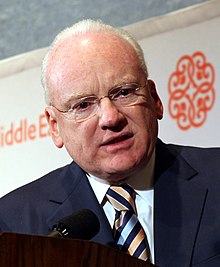
Back ريتشارد كلارك Arabic ريتشارد كلارك (مسؤول من امريكا) ARZ Richard Clarke German Richard A. Clarke Spanish Richard Clarke French Richard Clarke Dutch Кларк, Ричард Алан Russian Richard A. Clarke SIMPLE Річард Алан Кларк Ukrainian
Dick Clarke | |
|---|---|
 | |
| Assistant Secretary of State for Political-Military Affairs | |
| In office August 8, 1989 – July 10, 1992 | |
| President | George H. W. Bush |
| Preceded by | H. Allen Holmes |
| Succeeded by | Robert Gallucci |
| Personal details | |
| Born | Richard Alan Clarke October 27, 1950 Dorchester, Massachusetts, U.S. |
| Political party | Democratic |
| Education | University of Pennsylvania (BA) Massachusetts Institute of Technology (MSM) |
| Website | Official website |
Richard Alan Clarke[1] (born October 27, 1950) is an American national security expert, novelist, and former government official. He served as the Counterterrorism Czar for the National Coordinator for Security, Infrastructure Protection, and Counter-Terrorism for the United States between 1998 and 2003.
Clarke worked for the State Department during the presidency of Ronald Reagan.[2] In 1992, President George H. W. Bush appointed him to chair the Counter-terrorism Security Group and to a seat on the United States National Security Council. President Bill Clinton retained Clarke and in 1998 promoted him to be the National Coordinator for Security, Infrastructure Protection, and Counter-terrorism, the chief counter-terrorism adviser on the National Security Council. Under President George W. Bush, Clarke initially continued in the same position but no longer had Cabinet-level access. He was later appointed as Special Advisor to the President on cybersecurity. Clarke left the Bush administration in 2003.
Clarke came to widespread public attention for his counter-terrorism role in March 2004: He published a memoir about his service in government, Against All Enemies, appeared on the 60 Minutes television news magazine, and testified before the 9/11 Commission. In all three cases, Clarke sharply criticized the Bush administration's attitude toward counter-terrorism before the September 11 attacks, and its decision afterward to wage war and invade Iraq. Clarke was criticized by some supporters of Bush's decisions.
After leaving U.S. government, with U.S. government legal approvals, Clarke helped the United Arab Emirates to set up a cyber security unit[3] intended to protect their nation. Years after Clarke left,[4] some components of the program were acquired by a sequence of firms, and it is reported they eventually surveilled women's rights activists, UN diplomats, and FIFA officials.[3]
- ^ Dobbs, Michael (April 2, 2000). "An Obscure Chief in U.S. War on Terror". The Washington Post. Retrieved August 20, 2019.
- ^ "Profile: Richard Clarke". BBC News. March 22, 2004. Retrieved January 9, 2009.
- ^ a b "Special Report: White House veterans helped Gulf monarchy build secret surveillance unit". Reuters. December 10, 2019. Retrieved December 10, 2019.
- ^ "Made in America". Reuters. Retrieved September 22, 2021.
© MMXXIII Rich X Search. We shall prevail. All rights reserved. Rich X Search